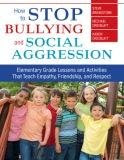Some children become chronically victimized early in their social development by their peers, and this may be more common in children who were aggressive in infancy, are from families with harsh parenting styles and insufficient income, according to an article released on October 6, 2008 in Archives of General Psychiatry, one of the JAMA/Archives journals (full article: How And Why Certain Children Receive Chronic Peer Abuse)
For me, this study is a reminder that common punitive consequences to bullying behavior or simplistic suggestions to targets of bullying (“just stand up to the bully”) are often meaningless. In many cases, the issues that cause someone to be aggressive or passive to such a point that they are chronically bullied have deep underlying causes. When an adult is working with a child who shows ongoing behaviors that perpetuate bullying, either as a bully or target, a deeper look into the background of the child can determine an effective plan of action to change the behavior that perpetuates the bullying.
A child’s personal history can’t be changed and a teacher may not be able to change the family dynamics, but a focused, well considered plan of action to teach pro-social behaviors to a child can effect his/her future. Taking this time is often difficult for many educators, considering all their responsibilities, but looking into a child's history, teaching pro-social skills, respect, citizenship, making healthy choices, etc. are part of each state’s education curriculum. It takes more time in the short run, but saves time, energy, resources, and frustration later.
This article focused mostly on insights into the commonality of those children who are chronically targeted. These children need assistance in understanding why they are abused and how to be assertive, be provided opportunities to enhance their self-esteem and develop healthy friendships and support systems. If they do not learn these skills, the abuse gets worse and often they become victims of domestic violence – dating/marrying aggressive people. On a similar note, some of these chronic targets develop a passive-aggressive style of behavior which is also inappropriate.
That got me thinking about aggressive children. Children who bully easy targets because they want to be the leader or ‘in charge’ need to learn how to accomplish that goal by gaining the respect of peers, as opposed to being feared by their peers. Those who use insulting humor to enhance a reputation of being funny (making bystanders laugh) need to learn how to be funny without being hurtful. This can be a tough skill to learn and master considering that put-downs and insults are a common comedic device on TV (a powerful role-model), but it can be done. Educators and parents need to remember that chronic bullies and targets need extra time learning respectful, pro-social skills like others need extra time learning math.
Studies, like the one referenced above, show that time and effort is being used to gain greater insight into the issue of bullying and that will lead to solutions. Children who learn how to get their needs met in a pro-social manner will become peaceful and respectful adults in the workplace and community. Politicians often mention the importance of learning math and science to be competitive in the global economy. I think it’s also important to balance that with happy, healthy, peaceful people.
I also suggest these articles regarding this study:
Why Some Kids Are Bullied From the Start (health.usnews.com)
Schoolyard Bullying: Which Kids Are Most Vulnerable? (http://www.time.com/time/health/article/0,8599,1850405,00.htm)
Steve
For ideas on how to teach pro-social skills, check out our book, How to Stop Bullying and Social Aggression
Sunday, October 19, 2008
Subscribe to:
Post Comments (Atom)



No comments:
Post a Comment